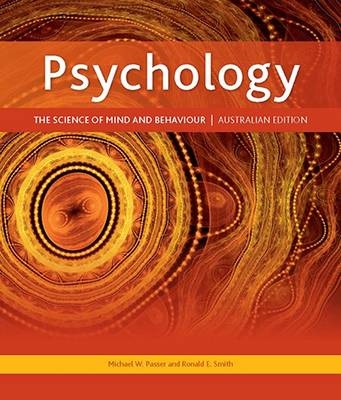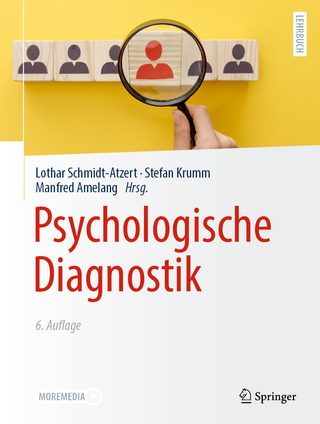
Pack
McGraw-Hill Education / Australia (Verlag)
978-1-74307-340-7 (ISBN)
- Titel erscheint in neuer Auflage
- Artikel merken
Throughout each chapter of this text is work by Australian academics and researchers, Australian statistics, cases, examples; especially in each chapter’s Australian Focus where we explore a uniquely Australian aspect related to that chapter.
In chapter 18, new to this Australian edition, we look closely at Indigenous and Cross-cultural Psychology within an Australian context. Where we aim to encourage active engagement with the topic and emphasise critical reflection and the development of frameworks and strategies to assist in future study and work.
Psychology: The Science of Mind and Behaviour supports student reading and comprehension of material through its text pedagogy:
Chapter focal questions, chapter outlines
Test Yourself review questions
Chapter summary and key terms
This print pedagogy is supported by Connect, our integrated online platform which is built around Introductory Psychology learning objectives, and features:
Learnsmart, an adaptive questioning diagnostic that helps students create individualised study plans
PsychInteractive, active learning modules, where students learn the scientific method as they observe data, formulate and test a hypothesis, communicate their findings, and apply their understanding of psychology.
Interactive tutorials that support concept comprehension
Auto-gradable exercises, with over 3500 questions to choose from
Media-rich, integrated eBook
Students develop understandings of the applications of psychology through examples in the text and Applying Psychological Science, which shows how information obtained from research can be applied at both personal and societal levels.
Research Close-up, which presents a research study in the format of a simple journal article; and Levels of Analysis, which shows how psychologists examine the interplay of biological, psychological, and environmental/social factors in order to understand behaviour, all prepare students to evaluate research and science critically. Thinking Critically allows students to practice this critical examination.
Michael W. Passer, Ph.D., coordinates the introductory psychology program at the University of Washington, which enrolls about 2,500 students per year, and also is the faculty coordinator of training for new teaching assistants (TAs). He received his bachelor’s degree from the University of Rochester and his PhD in Psychology from the University of California, Los Angeles, with a specialization in social psychology. Dr. Passer has been a faculty member at the University of Washington since 1977. A former Danforth Foundation Fellow and University of Washington Distinguished Teaching Award finalist, Dr. Passer has had a career-long love of teaching. Each academic year he teaches introductory psychology twice and a required pre-major course in research methods. Dr. Passer developed and teaches a graduate course on the Teaching of Psychology, which prepares students for careers in the college classroom, and also has taught courses in social psychology and attribution theory. He has published more than 20 scientific articles and chapters, primarily in the areas of attribution, stress, and anxiety, and has taught the introductory psychology course for 20 years. Ronald E. Smith, Ph.D., is Professor of Psychology and Director of Clinical Psychology Training at the University of Washington, where he also has served as Area Head of the Social Psychology and Personality area. He received his bachelor’s degree from Marquette University and his PhD from Southern Illinois University, where he had dual specializations in clinical and physiological psychology. His major research interests are in anxiety, stress and coping, and in performance enhancement research and intervention. Dr. Smith is a Fellow of the American Psychological Association. He received a Distinguished Alumnus Award from the UCLA Neuropsychiatric Institute for his contributions to the field of mental health. He has published more than 160 scientific articles and book chapters in his areas of interest and has authored or co-authored 23 books on introductory psychology, human performance enhancement, and personality, including Introduction to Personality: Toward an Integration, with Walter Mischel and Yuichi Shoda (Wiley, 2004). An award-winning teacher, he has more than 15 years of experience in teaching the introductory psychology course. Brian interests are in community, social and environmental psychology. He has worked with CSIRO on natural resource management issues in the last decade. He also has interests in Indigenous psychology. Research Interests: Community psychology, Applied social psychology, Indigenous issues, natural resource management, public participation, risk analysis and rural community psychology. My main field of research is Personality psychology. My research involves extending and clarifying current developments in personality psychology and critically assessing personality theories. I like to contribute to the theoretical frameworks that we use to develop accounts of personality through examining the underlying assumptions and drawing attention to critical issues relevant to all personality theories (e.g., the distinctions between description and explanations, and relations and the terms of relations). My research here also involves understanding what is meant by 'self' and 'identity', personality responses to serious health threats, the relation of personality to evolutionary psychology, personality and culture, neuroscience and personality, and the influence of attachment processes upon development. I also enjoy looking at the history of personality research (and of psychology generally). My own approach to personality favours a psychodynamic perspective and my central interests here include defense mechanisms (especially repression) and unconscious mental processes. My published research covers the neuroscientific debate surrounding Freudian dream theory, defense mechanisms, and whether repression can be a conscious process. The theory of Freudian repression has been attacked variously in the scientific literature but I have endeavoured to demonstrate that many critics of Freudian repression actually have very little understanding of what Freud had to say on the matter. In the last 15 years, understanding of how the brain processes information has increased greatly as neuro-imaging techniques have been coupled with paradigms drawn from experimental psychology to investigate information processing in individuals with typical and disturbed brain development. My research applies the insights emerging from this research to understand how early disturbances in brain development, resulting from injury, genetically based developmental disorders, or atypical experiences such as chronic stress may influence information processing. I am interested in fundamental questions about human neuropsychological development, for example, the plasticity of different functional systems following early insult and/or atypical environmental experiences, and also in the application of the results of fundamental research to practical questions about how to optimize the development of children at heightened risk as a result of early insult and/or atypical environmental experiences. My current research focuses on the associations between anxiety, information processing and school learning. Many children experience high levels of anxiety, sometimes for lengthy periods as a result of divorce, illness in the family, teasing at school. Key questions are how anxiety affects the fundamental information processes, e.g. attention and memory, called on by school learning, how school learning can be protected in children experiencing high levels of anxiety, and whether interventions designed to manage the experience of anxiety reverse the effects of anxiety on information processing. I am interested in developmental, comparative and evolutionary aspects of cognition. In our comparative lab group we are investigating the performance of children and primates on non-invasive behavioural tasks such as invisible displacement, imitation recognition, mirror self-recognition, planning, and means-ends reasoning. We conduct studies with chimpanzees, orangutans, gorillas, gibbons, and spider monkeys at various zoos in Australia, the USA and Indonesia. Young children are tested here in the Early Cognitive Development Centre in the School of Psychology. I am interested in the abilities that allow people to speak fluently and easily. My research focuses on the processes of phonological encoding and articulation described by cognitive theories of spoken word production. I study these processes by investigating the speech and language impairments that can result from dementia, stroke, or traumatic brain injury. I also supervise research projects with unimpaired speakers, investigating speech production in difficult contexts (such as saying tongue twisters or learning the sounds of a foreign language). I teach quantitative methods in the Department, primarily in the areas of research methods, structural equation modelling, multilevel modelling, item response modelling and regression. My research interests broadly cover two main areas: (a) the use of structural equation modelling and multilevel modelling, and (b) the application of quantitative methods to psychological data, especially in the area of the psychopathology of psychotic disorders. As well as my own research in these two areas, I am also involved in a large scale longitudinal study of affect regulation in early adolescence that is headed by Professor Nick Allen at the ORYGEN Research Centre in Parkville, and have ongoing research collaborations with a number of researchers at the ORYGEN Research Centre. Computer programs I have written can be downloaded from my personal website listed above, and it contains a link to a listing of general quantitative methods resources. Our sense of vision is fundamental to our ability to interact with the world. Additionally, a great deal of our understanding of how the brain functions is based on our knowledge of how it processes visual information. The aim of my research is to further our understanding of the workings of the human visual system, with an emphasis on how various visual pathways interact at different levels in the brain. While I am interested in all aspects of visual processing, my research to date has mainly focused on motion, stereopsis and face processing I joined the School in 2010 after 2.5 years working as a post-doctoral researcher in the Discipline of Paediatrics at the University of Adelaide. I currently teach into developmental psychology topics, cognitive neuroscience, sleep, memory and general psychology topics at an undergraduate level. I supervise Honours, Masters and PhD students in the School and across institutions. My research currently focuses on the importance of sleep for memory and cognitive performance, child mental health, critical periods of cognitive development, and the neural basis of cognitive functions. Together with Drs Hannah Keage and Owen Churches, I coordinate the new Cognitive Neuroscience laboratory which houses EEG and transcranial doppler facilities. I also collaborate with researchers at the Childrens Research Centre, University of Adelaide, at which I am an Affiliate Lecturer, and the Department of Neurology at the University of Rome (La Sapienza), Italy Andrew is an Associate Professor in the School of Psychology and a clinical psychologist. He supervises Honours and higher degree students. Research interests: Infant, child and adolescent mental health,Developmental Psychopathology, Attachment theory, Evolutionary psychology,Psychoanalysis Joel Pearson studies the mechanisms and application of mental imagery, decision-making, memory, visual perception, learning, attention and awareness by using behavioural, human brain imaging and transcranial magnetic stimulation techniques Scientifically I am interested in understanding human intelligence and cognition. I tackle this central question from both psychological and biological perspectives (particularly using pharmacological methods). A significant part of this approach is to better understand the cognitive effects of a wide range of pharmacologically active substances ranging from illicit drugs to herbal and nutrient medicines. From a practical perspective I am interested in improving emotional competencies in organizations and in educational settings, particularly primary and secondary schools Thea is an Assistant Professor in Psychology at the Centre for Applied Psychology. She is a cognitive psychologist whose primary area of research area is memory. Her PhD was on verbal overshadowing, an area of applied memory research relating to eyewitness testimony. Her expertise and interests include memory, eyewitness testimony and physiological psychology. Before studying psychology, she completed a Bachelor of Arts in Computing Studies and worked as a computer programmer and IT consultant for 10 years. Research Areas: The adaptive functions of positive, social emotions (e.g., pride, gratitude); Discrete emotions’ effects on stereotypes and prejudice; Impression formation in teams or groups
Chapter 1: The Science of Psychology
Chapter 2: Studying Behaviour Scientifically
Chapter 3: Genes, Environment and Behaviour
Chapter 4: The Brain Behaviour
Chapter 5: Sensation and Perception
Chapter 6: States of Consciousness
Chapter 7: Learning: The Role of Experience
Chapter 8: Memory
Chapter 9: Language and Thinking
Chapter 10: Intelligence
Chapter 11: Motivation and Emotion
Chapter 12: Development Over The Life-Span
Chapter 13: Personality
Chapter 14: Health and Well-Being
Chapter 15: Psychological Disorders
Chapter 16: Treatment of Psychological Disorders
Chapter 17: Social Thinking and Behaviour
Chapter 18: Indigenous and Cross-Cultural Psychology
| Erscheint lt. Verlag | 15.6.2012 |
|---|---|
| Sprache | englisch |
| Maße | 230 x 276 mm |
| Gewicht | 1990 g |
| Themenwelt | Geisteswissenschaften ► Psychologie |
| ISBN-10 | 1-74307-340-2 / 1743073402 |
| ISBN-13 | 978-1-74307-340-7 / 9781743073407 |
| Zustand | Neuware |
| Haben Sie eine Frage zum Produkt? |
aus dem Bereich



